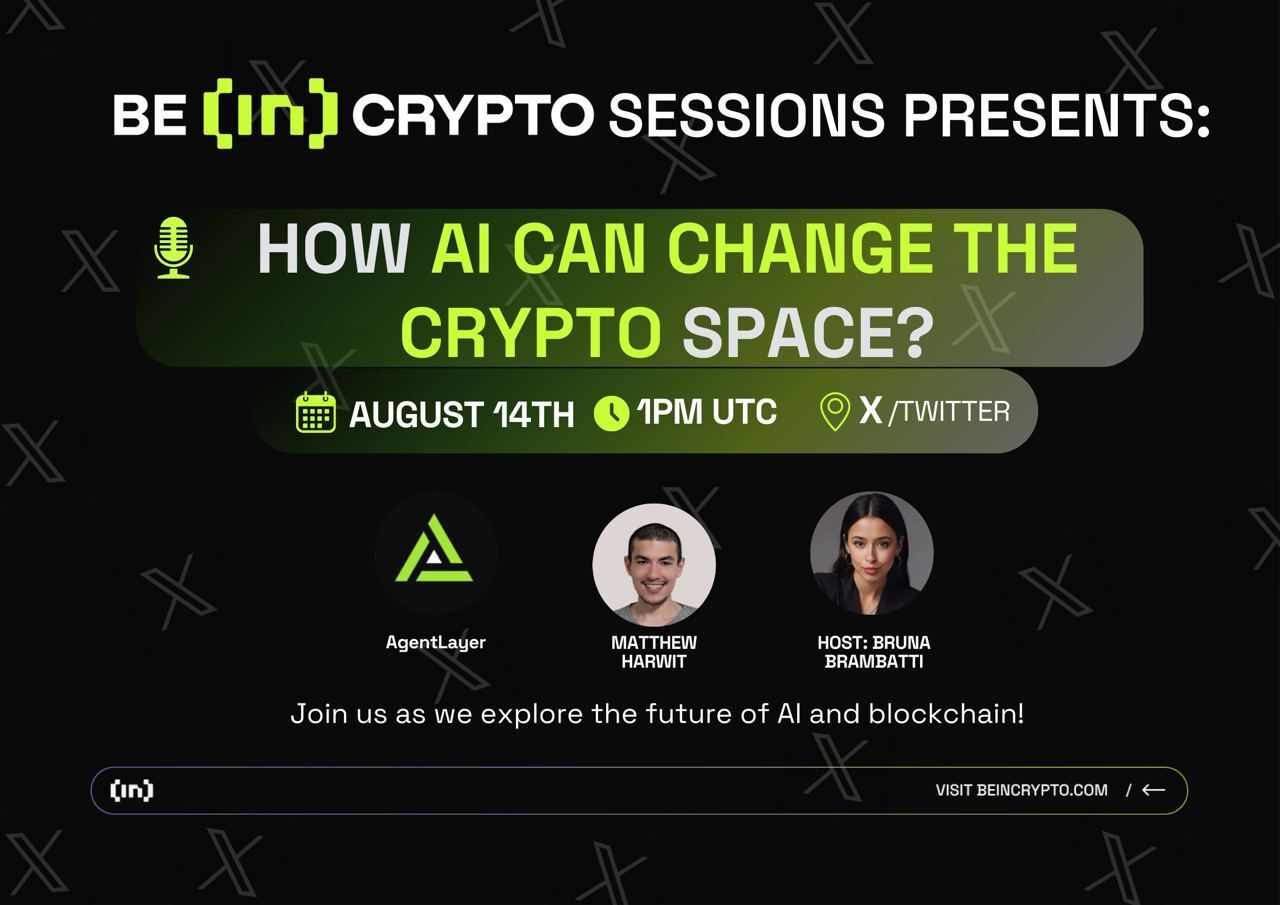AI Meets Blockchain: Professor Liu Yang of AgentLayer on AI Agents Transforming the Web3 Space
08/20/2024 13:05
In a recent Twitter Space interview, BeInCrypto spoke with Professor Liu Yang, an AI and blockchain expert.
In a recent Twitter Space interview, BeInCrypto spoke with Professor Liu Yang, an AI and blockchain expert, to delve into how AgentLayer is bringing transformative changes to the blockchain world with AI agents.
Professor Liu Yang, known for his extensive research in AI and blockchain integration, shared insights into the current state of artificial intelligence, its role in various industries, and specifically how AgentLayer is leveraging AI to enhance the crypto ecosystem.
Ai’s Current State and Impact on Crypto
The conversation kicked off with a discussion on the current state of AI. Professor Liu Yang addressed common concerns about AI potentially making harmful decisions.
He clarified, “The existing AI architecture is still limited. It generates responses by predicting the next word in a sequence rather than reasoning or truly understanding its output. This restriction means that while AI is advancing rapidly, it’s not yet at a stage where it can independently cause harm.”
He further explained the importance of AI safety, highlighting that major companies like OpenAI and Anthropic prioritize safety over rapid advancements.
“We should be cautiously optimistic,” he noted, “AI currently aids more than it harms, and with the ongoing emphasis on safety, it’s likely to continue being a beneficial tool.”
How AI Is Transforming Industries Today
AI’s transformative impact on industries was another key topic. Professor Liu Yang pointed out that AI excels in areas where generating content from scratch is valuable, such as software development, marketing, and education.
“Generative AI has fundamentally empowered people to create more easily, whether it’s code, marketing materials, or educational resources,” he said.
However, data control remains a challenge in AI applications. Professor Liu Yang mentioned that while companies claim to anonymize data, there is always a degree of uncertainty about how this data is used.
“It’s similar to the current concerns with Google and Facebook; the difference lies in how AI might be trained on this data.”
AI Agents in the Blockchain Ecosystem
The discussion then shifted to AgentLayer, a platform that allows users to interact with AI agents. Professor Liu Yang described these agents as more advanced than traditional chatbots, capable of performing real-world tasks.
“Imagine having a personal assistant that can book flights, manage your schedule, and even handle complex tasks like engineering work,” he explained.
AgentLayer’s AI agents are designed to promote decentralization within the crypto ecosystem. By leveraging blockchain technology, the platform ensures transparency, security, and trust in AI applications. Additionally, the native $AGENT token incentivizes participation, creating a sustainable economy for AI agent development and usage.
Professor Liu Yang elaborated on how AgentLayer aligns its AI agents within the crypto ecosystem to foster innovation while ensuring economic viability.
“At AgentLayer, developers create AI agents that users can access by paying with $AGENT tokens. The revenue is then shared among the developers, node owners, and a growth pool for further incentivizing ecosystem development.”
He envisions a future where thousands of AI agents on AgentLayer will assist users in discovering promising crypto projects, analyzing market conditions, and improving work efficiency. This ecosystem not only fosters innovation but also provides developers and users with tangible financial benefits.
When asked about standout AI innovations, Professor Liu Yang highlighted examples like Sora’s text-to-video conversion and OpenAI’s personalized voice-based assistant. He emphasized AgentLayer’s mission to connect the decentralized power of Web3 with AI, ensuring that users retain control over their data while benefiting from AI advancements.
The Future of AI in Daily Life and Crypto
As the conversation drew to a close, Professor Liu Yang reflected on the future of AI, both within the crypto ecosystem and in broader society. He emphasized that AI would increasingly become a tool for enhancing productivity and efficiency.
“In general, I think the future for AI will continue to head towards a world where the people that embrace AI and use it to improve their work will get further and further ahead of people that don’t,” he advised.
He also noted that while full automation of jobs by AI is still a distant prospect, those who leverage AI to enhance their work will see significant gains in efficiency.
“I don’t think jobs will be fully automated and done by AI for at least another 10 years, and likely a lot longer, but I do think the people that choose to turn another eye towards AI will end up being able to 20x their efficiency, if not more,” he predicted.
In his closing remarks, Professor Liu Yang offered practical advice for those looking to integrate AI into their daily lives and work.
“My best advice for anyone looking into AI is to try using it for your work. I’d recommend using Claude’s sonnet 3.5—this isn’t an endorsed message, but paying for the $20/month subscription is well worth it. It will change your life and make you much more efficient,” he suggested.
Professor Liu Yang concluded the session by reiterating AgentLayer’s mission to combine the best of AI and blockchain technology to create a decentralized, equitable, and innovative ecosystem.
“For us, the mission has always been about marrying the power of Web3 with decentralization and permissionless concepts with AI. We want to make sure that the people always remain in control of their data while reaping the benefits that AI has to offer,” he emphasized.
Trusted
Disclaimer
In compliance with the Trust Project guidelines, this opinion article presents the author’s perspective and may not necessarily reflect the views of BeInCrypto. BeInCrypto remains committed to transparent reporting and upholding the highest standards of journalism. Readers are advised to verify information independently and consult with a professional before making decisions based on this content. Please note that our Terms and Conditions, Privacy Policy, and Disclaimers have been updated.